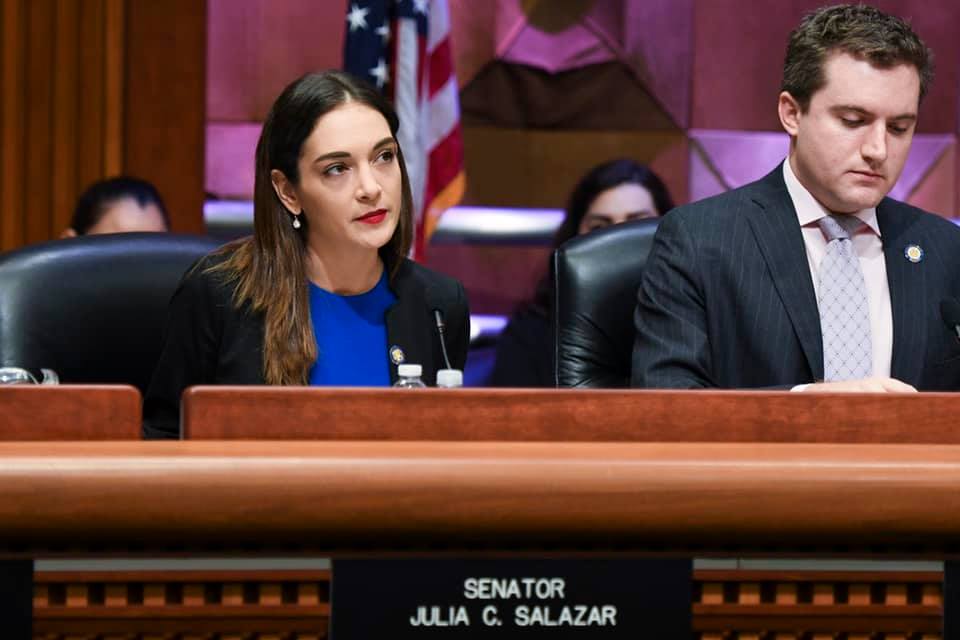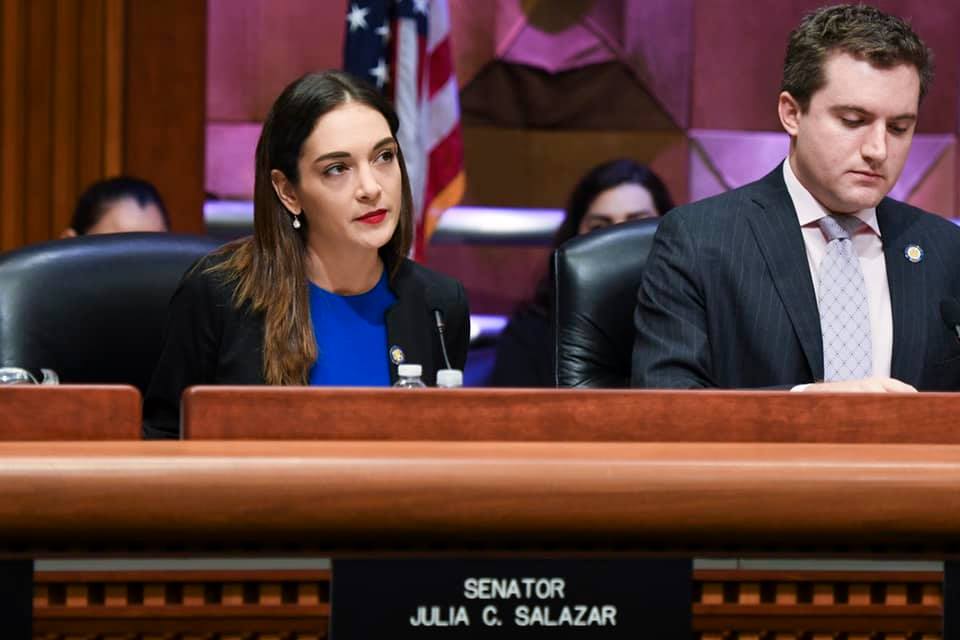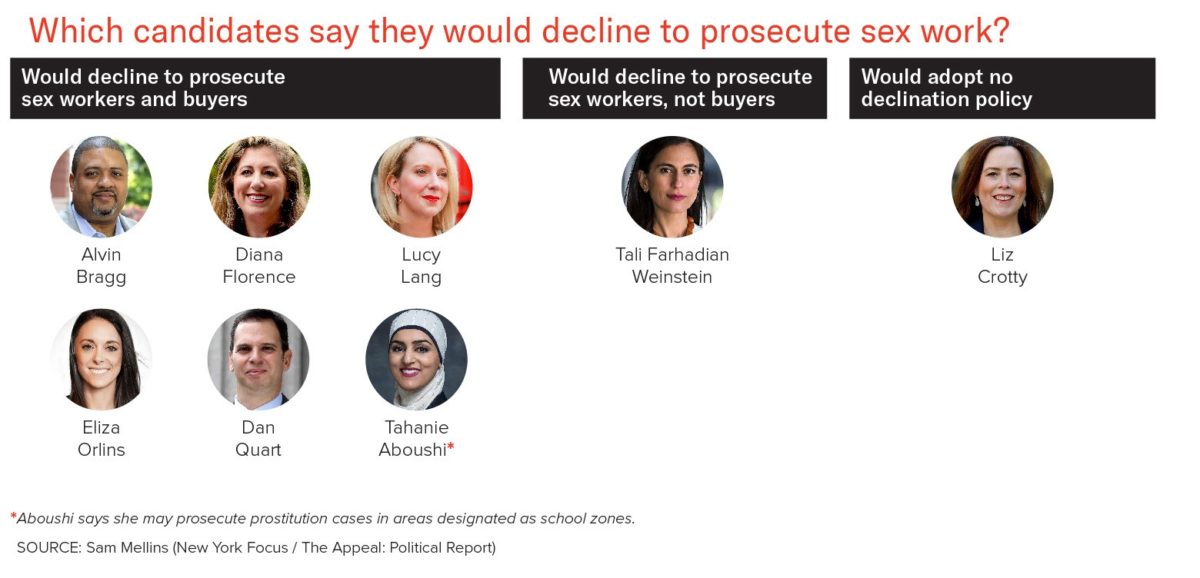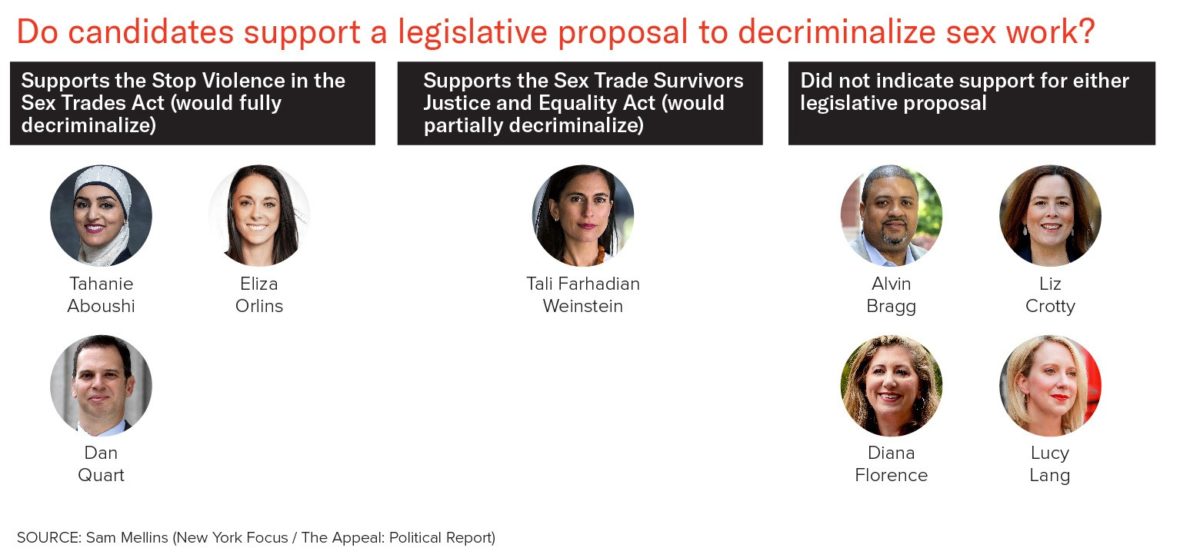In Manhattan D.A. Race, Momentum Builds to Decriminalize Sex Work
Most candidates running in the June election for DA say they would not prosecute cases involving consensual sex work, a striking sign of local activists’ success.
Sam Mellins | March 4, 2021


This article originally appeared on The Appeal, which hosted The Political Report project.
Most candidates running in the June election for DA say they would not prosecute cases involving consensual sex work, a striking sign of local activists’ success.
This article is published as part of a partnership between New York Focus and The Appeal: Political Report to cover Manhattan’s 2021 elections. Read our first two articles, on the war on drugs and statewide advocacy.
New York State appears to be on a trajectory of expanding the rights of sex workers. On Feb. 2, the state repealed its “walking while trans” ban, an anti-loitering law that critics said the police were using to harass trans New Yorkers. Many advocates are pressing for the passage of legislation that would decriminalize sex work.
But most of the candidates seeking to be elected as Manhattan’s next district attorney this year don’t want to wait for the legislature. If they win, they say, they would take the DA’s office entirely out of the business of going after consensual sex work.
Six of the eight declared candidates told New York Focus and The Appeal: Political Report that they would stop prosecuting charges involving sex work, whether against people who are selling sex or against buyers.
The relative consensus is a measure of how quickly attitudes on sex work have shifted since even 2019, when only one out of seven candidates for Queens DA, Tiffany Cabán, supported the full decriminalization of sex work. A coalition of activists, known as Decrim NY, launched in 2019 and has strenuously championed change since then.
Even among those six Manhattan DA candidates, though, differences emerged in their interests in advocating for statewide legislation that would decriminalize sex work and in whether they include any carve-outs in their policies.
A seventh candidate says she would decline to prosecute cases against sex workers but keep pursuing charges against buyers and suppliers of sex work. This approach, known as the “Nordic model” or partial decriminalization, was far more prevalent among the Queens candidates two years ago. Critics of the approach worry it still gives too much room to the criminal legal system and continues to expose sex workers to law enforcement.
The winner of the Democratic primary in June will determine the extent to which the status quo changes for sex workers in Manhattan.
More than 2,000 sex workers have been arrested in Manhattan since 2010, when DA Cy Vance took office. Investigations have found that the vast majority of those arrested for buying or selling sex in New York City are nonwhite. The borough’s prosecutors generally dismiss charges against sex workers in exchange for completing a five-session course with social work professionals on “exit strategies” out of the sex trade, but that system leaves them subject to police harassment and to the disruptions of arrests and interactions with the court system.
“Every time you have to deal with police, it’s always harmful,” TS Candii, a sex worker and the founder of Black Trans Nation, a trans and sex workers’ rights organization, told New York Focus and the Political Report. “I’ve been coerced into sexual favors” by police while on the job, Candii said, adding that “99.99 percent” of the sex workers she knows have had similar experiences of abuse or harassment at the hands of law enforcement.
Vance, who has not announced whether he is running for re-election, did not respond to a request for comment regarding his positions on prosecuting sex work.
Advocates point to the death of sex worker Yang Song in 2017 as a particularly stark example of the costs of criminalization. Song died after falling four stories from a Queens apartment building while police were attempting to arrest her for allegedly engaging in sex work.
People arrested on prostitution charges in Manhattan are typically released pretrial, at least initially, but they face detention if they miss their court dates. In 2019, Layleen Polanco, a transgender woman, died while incarcerated pretrial at Rikers Island on sex work charges, unable to pay her $500 bail.
“Layleen Polanco is a perfect example of someone who died alone in a cell when one of her underlying offenses was sex work, survival sex for a Black trans Latina who was excluded from many parts of the formal economy,” Jared Trujillo, policy counsel at the New York Civil Liberties Union and a former sex worker, told New York Focus and the Political Report.
Even the incarceration alternatives that people are steered toward when arrested can be inconvenient and burdensome, sex workers and their advocates said. Abigail Swenstein, a Legal Aid attorney who has represented many sex workers, warned against assuming that sex workers benefit from prosecutors’ help. “Not everybody wants the counseling sessions,” she said.
Declining to prosecute
Five candidates—public defender Eliza Orlins, Assemblymember Dan Quart, and former prosecutors Alvin Bragg, Diana Florence, and Lucy Lang—told New York Focus and the Political Report that they would never prosecute buyers or sellers of consensual sex between adults.
Declining prosecution would involve not pursuing any charges over these behaviors, and would go further than the current approaches of conditioning diversion on requirements such as courtroom visits and counseling sessions.
“The criminalization of sex work is something that has really disproportionately hurt women of color, trans women of color, LGBTQIA folks,” Orlins said. Orlins has made decriminalizing sex work a major pillar of her campaign, and released a policy paper on the issue in January.
Quart said he would decline to prosecute sex work with “no ifs, ands, or buts” because criminalization exposes sex workers to violence and discourages them from reporting abuse. Florence said “sex work is work” and Lang said “private consensual sex between adults should not be criminal,” explaining why they both supported full decriminalization.
Bragg cited “deeply disturbing” racial disparities in enforcement as part of the reason he supports decriminalization. “For the past four years in New York City, 89 percent of persons charged for selling sex were nonwhite,” he noted.
Another candidate, civil rights attorney Tahanie Aboushi, also says she would decline to prosecute cases involving both sellers and buyers of consensual sex work. But she added that she would consider prosecuting individuals arrested for behavior tied to prostitution in a school zone. “We obviously want to protect our children, and make sure that when people are ticketed for this particular reason, it’s because they’re actually within the school zone,” Aboushi said, adding that she would not seek to incarcerate individuals arrested for this offense.
The five candidates who said they would never prosecute charges related to consensual sex work confirmed that they would not prosecute this offense. Quart explained that the offense is “overbroad and vague in its wording,” and added that he would consider prosecution if the statute were revised to be “more specific” in its definition of a school zone. A “school zone” includes swaths of area surrounding schools, which covers a lot of people in dense Manhattan.
From 2016 through 2019, 16 individuals were arrested in Manhattan for prostitution in a school zone without also being charged with a more serious crime, according to police records. The NYPD may not be currently coding some arrests as occurring within a “school zone” even when they do, and some advocates warn that the police could potentially ramp up such reports if that were the only charge the DA office prosecuted.
The two remaining candidates in the DA field took markedly different approaches.


Former prosecutor Tali Farhadian Weinstein said in a statement that she would “decline to prosecute those who sell sex but continue to pursue purchasers and facilitators of the selling of sex when public safety requires I do so.” She declined to specify particular circumstances in which public safety would require prosecution of purchasers of sex.
Farhadian Weinstein’s approach aligns with the so-called Nordic model or “equality model” of decriminalization, in which selling sex is decriminalized but buying sex remains a crime.
Brooklyn DA Eric Gonzalez embraced this approach in January, when he announced his office would no longer prosecute sex workers but would continue to pursue charges against others.
Some lawmakers and former sex workers support this model. They argue that it will shield sex workers from criminal exposure while also shrinking the industry overall by reducing demand, a goal they say is essential to protect people from exploitation by sex buyers and traffickers.
But other advocates say criminalizing the buying of sex keeps the entire industry underground, where sex workers have fewer protections, and keeps sex workers subject to police harassment. They also say that partial decriminalization is paternalist and that many people involved in sex work are not looking to be rescued by the criminal legal system.
The equality model “keeps the police in people’s business,” Candii said. “Not only would the police continue to police our bodies, but in order for the police to get to the buyers, the police would still have to use surveillance, watch the sellers …. It would put the eyes on us from the police, so that they can get to the johns. And then the johns that they are getting is our family members, is our brothers, is our sisters.”
Bragg, one of the candidates who would implement a declination policy that is aligned with a full decriminalization approach, also faults the Nordic model for leaving communities of color subject to disproportionate arrests for purchasing sex. He notes that “93 percent of those accused of trying to buy sex were nonwhite” in New York in the years 2017 through 2020.
The final DA candidate, former prosecutor Liz Crotty, told the Political Report and New York Focus that she would not institute any blanket policy of declining to prosecute either buyers or sellers.
Crotty said she “definitely” supports the decriminalization of sex work but believes that it should be done through the legislature. Until the legislature takes that step, she said, she would still consider prosecution.
“The job of the district attorney is to enforce the laws of the state of New York. To the extent that it’s still on the books, you have to look at each and every case,” she said.
An opening to change state laws
The rift between those who are pushing for full decriminalization and others who are promoting the Nordic model is also playing out in Albany.
Two competing bills, written by Democrats, each champion one of these approaches.
The Stop Violence in the Sex Trades Act, introduced by Senator Julia Salazar and Assemblymember Richard Gottfried and championed by the Decrim NY coalition, would decriminalize the buying and selling of sex between consenting adults. Another proposal, the Sex Trade Survivors Justice and Equality Act, which Senator Liz Krueger and Assemblymember Pamela Hunter plan to introduce, would decriminalize the selling of sex but continue to criminalize buying sex, according to news reports. It would also remove incarceration as a possible punishment for buying sex.
The next Manhattan DA is likely to wield considerable influence as a legislative advocate in Albany, and would be well-positioned to weigh in on this ongoing debate.


Quart, Aboushi, and Orlins said they would push for the legislature to adopt the full decriminalization bill. Quart noted that he was an early legislative sponsor of the full decriminalization bill when it was introduced.
Florence said she supports full decriminalization, but the Salazar-Gottfried bill currently “has loopholes that would hinder sex trafficking prosecutions.” If elected, she said, she would seek to work with the legislature to address these loopholes.
Farhadian Weinstein, by contrast, said she supports the partial decriminalization bill, a position that matches her preferences for partial declination policy in the DA’s office. “Senator Liz Krueger’s bill … proposes the right balance of safety and fairness on this subject,” Farhadian Weinstein told New York Focus and the Political Report.
Lang said she supports “legislation that decriminalizes private consensual sex between adults.” When asked whether she would support either of the two bills currently pending, she replied, “I’m not running for the legislature.”
Bragg’s spokesperson said the candidate does not have a position on either bill, and Crotty did not respond to a question about her position on the two bills.
The footprint of law enforcement
Even if the next DA of Manhattan declined to prosecute sex work, the police could still make arrests, though arrest rates would likely decrease. And so advocates are making the case for changing NYPD practices as well.
In recent months, politicians and advocates have raised the idea of eliminating the NYPD vice squad, a special division of the police force heavily involved in law enforcement response to sex work. A December investigation by ProPublica revealed that the vice squad frequently engages in abusive practices toward individuals accused of sex work-related offenses and often makes arrests for sex crimes on the basis of little or no evidence.
Aboushi, Bragg, Orlins, and Quart said that as DA, they would advocate for the disbanding of the vice squad. Orlins said that in addition to pushing the disbanding of the division, she would also advocate for “reallocation of their budget to sex worker peer-led services.”


Crotty, Farhadian Weinstein, Florence, and Lang stopped short of calling for the vice squad to be disbanded, though all expressed opposition to some of its practices.
The recent growth of support for decriminalization shows the success of the movement of sex workers who are fighting to overcome stigma and secure their rights, local activists say. “Sex work is work,” Trujillo said. “Through determination and resilience, sex workers and advocates have built political power and forced folks to take their safety seriously.”
The graphic has been updated to reflect that the legislative proposal to partially decriminalize sex has not been introduced as legislation.




